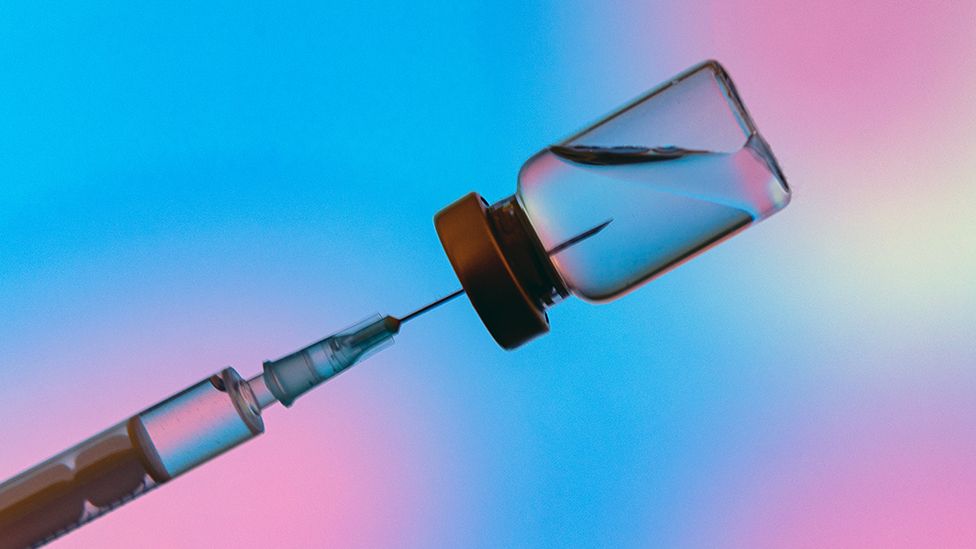Covid vaccine: Why did EU take AstraZeneca to court?
- Published

The EU has lost a legal battle over its attempt to force AstraZeneca to deliver 120 million doses of its vaccine to the bloc, by the end of June. A court in Belgium ruled that AZ still has to deliver a total of 80 million doses by September, but this is significantly less than the EU was demanding.
What has the court decided?
The court ruled on 18 June that AstraZeneca must deliver a total of 50 million coronavirus vaccine doses to the EU by 27 September, on top of the 30 million it had already delivered, by the end of the first quarter of this year.
According to the ruling, the company has to deliver:
- 15 million doses by 26 July
- 20 million doses by 23 August
- 15 million doses by 27 September
If it doesn't meet these obligations, AstraZeneca will incur a €10 fine per undelivered dose.
What were the reactions to the ruling?
AstraZeneca welcomed the court's decision and said in a statement it will deliver substantially more than 80 million doses by the end of June 2021: "All other measures sought by the European Commission have been dismissed, and in particular the Court found that the European Commission has no exclusivity or right of priority over all other contracting parties."
The European Commission wanted substantially more than the court ordered - a total of 120 million vaccine delivered by the end of June 2021, and 300 million doses by the end of September.
The Commission nevertheless claimed the ruling as a victory. Ursula von der Leyen commented that the "decision confirms the position of the Commission: AstraZeneca did not live up to the commitments it made in the contract".
How did the EU-AstraZeneca dispute start?
The EU has been at odds with AstraZeneca over its contract for 300 million doses of the vaccine, signed in August 2020. The European Commission says only 30 million jabs arrived in the first three months of 2021, out of 90 million which AstraZeneca was supposed to deliver.
In the second quarter of the year, AstraZeneca said it could deliver only 70 million of the promised 180 million doses.
In April, the European Commission sued the company for not respecting its vaccine supply contract and for not having a "reliable" plan to ensure timely deliveries. All 27 EU countries supported the legal action.
What did AstraZeneca say?
AstraZeneca said it had "fully complied" with its agreement with the EU and hoped to resolve the dispute as soon as possible. The company had previously said the contract obliged it to make its "best effort" to meet EU orders.
It blamed production problems at a plant in Belgium - but the EU said its contract identified a number of plants, both in the EU and the UK, where the EU could source supplies.
The company acknowledged its agreement with the EU allowed the option of supplying Europe from UK sites, but only once the UK had sufficient supplies.
The full details of the company's deals with the UK and the EU have not been made public.
Analysis by the Politico website points to a clause in the UK's contract, saying the government "may terminate the deal and invoke what appear to be punishment clauses" if there is a delay in supply.
But the EU contract did not include such harsh potential consequences, Politico says.
Where is the EU's AstraZeneca vaccine manufactured?
AstraZeneca says supplies are coming mainly from the US, and Seneffe in Belgium.
At the end of March, the EU's medicines authority approved a site in Leiden, in the Netherlands, to produce AstraZeneca vaccines for the EU.
Since 30 January, exports from AstraZeneca plants in the EU to the UK have been limited to materials for clinical trials and samples only, the European Commission says.
But before then, a million AstraZeneca jabs had been exported to the UK.
AstraZeneca said in March the UK had not received any vaccines or components from the EU - apart from one "tiny" batch from the Leiden plant.
What about the UK?
The Oxford-AstraZeneca vaccine is made in Oxford and Keele. A third plant in Wrexham puts the vaccine into vials, and packages them up for distribution.
The UK has ordered 100 million doses. Almost all will come from within the UK, but 10 million doses are being made by the Serum Institute in India.
Half of this consignment has been received, the other half has been delayed - but, given India's current Covid problems, it is unclear when the remaining doses will be delivered.
What about other vaccines?
The Pfizer jab is mostly made in Puurs, in Belgium, and a manufacturing site has also been set up in the German town of Marburg. The UK has ordered 100 million doses of Pfizer.
On 20 April, the European Commission said the EU had exported 25 million doses to the UK, but it was unaware of any vaccines going the other way. EU leaders considered banning exports of vaccines to the UK but decided against.
Vaccines may be produced in one place but "filled and finished" - put into vials and prepared for export - in another.
The Moderna vaccine is produced in Switzerland and put into vials in Spain - the UK has ordered 17 million doses
The Johnson & Johnson/Janssen jab is made in the Netherlands - the UK has ordered 30 million doses
And some components used in the process may be made at yet another location.
For example, the UK company Croda is supplying a component to Pfizer to make its vaccine.